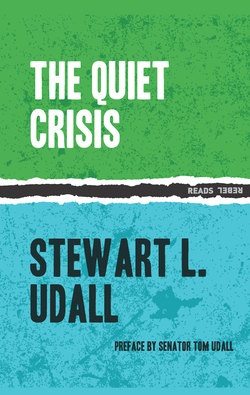Читать книгу The Quiet Crisis - Stewart L. Udall - Страница 7
На сайте Литреса книга снята с продажи.
ОглавлениеINTRODUCTION
THE HISTORY of America, is more than that of most nations, the history of man confornted by nature. Our story has been peculiarly the story of man and the land, man and the forests, man and the plains, man and water, man and resources. It has been the story of a rich and varied natural heritage shaping American institutions and American values; and it has been equally the story of Americans seizing, using, squandering and, belatedly, protecting and developing that heritage. In telling this story and giving this central theme of American history its proper emphasis and dignity, Secretary Udall puts us all in his debt.
From the beginning, Americans had a lively awareness of the land and the wilderness. The Jeffersonian faith in the independent farmer led the foundation for American democracy; and the ever-beckoning, ever-receding frontier left an indelible imprint on American society and the American character. And Americans pioneered in more than the usual way. We hear much about “land reform” today in other parts of the world; but we do not perhaps reflect enough on the extent to which land reform, from the Northwest Ordinance through the Homestead Act of the Farm Security Administration and beyond, was an American custom and an American innovation.
Yet, at the same time that Americans saluted the noble bounty of nature, they also abused and abandoned it. For the first century after independence, we regarded the natural environment as indestructible—and proceeded vigorously to destroy it. Not till the time of Marsh and Schurz and Powell did we begin to understand that our resources were not inexhaustible. Only in the twentieth century have we acted in a systematic way to defend and enrich our natural heritage.
The modern American record in conservation has been brilliant and distinguished. It has inspired comparable efforts all around the earth. But it came just in time in our own land. And, as Mr. Udall’s vivid narrative makes clear, the race between education and erosion, between wisdom and waste, has not run its course. George Perkins Marsh pointed out a century ago that greed and shortsightedness were the natural enemies of a prudent resources policy. Each generation must deal anew with the “raiders,” with the scramble to use public resources for private profit, and with the tendency to prefer short-run profits to long-run necessities. The nation’s battle to preserve the common estate is far from won.
Mr. Udall understands this—and he understands too that new times give this battle new forms. I read with particular interest his chapter on “Conservation and the Future,” in which he sets forth the implications for the conservation effort of the new science and technology. On the one hand, he notes, science has opened up great new sources of energy and great new means of control. On the other hand, new technical processes and devices litter the countryside with waste and refuse, contaminate water and air, imperil wildlife and man, and endanger the balance of nature itself. Our economic standard of living rises, but our environmental standard of living—our access to nature and respect for it—deteriorates. A once beautiful nation, as Mr. Udall suggests, is in danger of turning into an “ugly America.” And the long-run effect will be not only to degrade the quality of the national life but to weaken the foundations of national power.
The crisis may be quiet, but it is urgent. We must do in our own day what Theodore Roosevelt did sixty years ago and Franklin Roosevelt thirty years ago; we must expand the concept of conservation to meet the imperious problems of the new age. We must develop new instruments of foresight and protection and nurture in order to recover the relationship between man and nature and to make sure that the national estate we pass on to our multiplying descendants is green and flourishing.
I hope that all Americans understand the importance of this effort, beecause it cannot be won until each American makes the preservation of “the beauty and the bounty of the American earth” his personal commitment. To this effort, Secretary Udall has given courageous leadership, and, to this understanding, The Quiet Crisis makes a stirring and illuminating contribution.
JOHN F. KENNEDY
